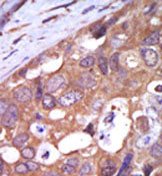PKC mu (PRKD1) (N-term) Rabbit Polyclonal Antibody
CAT#: AP13552PU-N
PKC mu (PRKD1) (N-term) rabbit polyclonal antibody, Purified
Need it in bulk or conjugated?
Get a free quote
CNY 6,314.00
货期*
5周
规格
Specifications
| Product Data | |
| Applications | IHC, WB |
| Recommend Dilution | ELISA: 1/1,000. Western blotting: 1/100 - 1/500. Immunohistochemistry: 1/50 - 1/100. Immunoprecipitation (Application validated by third-party citation.) |
| Reactivity | Human, Mouse |
| Host | Rabbit |
| Clonality | Polyclonal |
| Immunogen | This antibody is generated from rabbits immunized with a KLH conjugated synthetic peptide selected from the N-terminal region of human PKC mu. |
| Specificity | This antibody reacts to PKC mu. |
| Formulation | PBS with 0.09% (W/V) sodium azide State: Purified State: Liquid purified Ig |
| Concentration | lot specific |
| Purification | Protein G column, eluted with high and low pH buffers and neutralized immediately, followed by dialysis against PBS |
| Conjugation | Unconjugated |
| Storage Condition | Store the antibody undiluted at 2-8°C for one month or (in aliquots) at -20°C for longer. Avoid repeated freezing and thawing. |
| Gene Name | protein kinase D1 |
| Database Link | |
| Background | Protein kinase C (PKC) is a family of serine- and threonine-specific protein kinases that can be activated by calcium and second messenger diacylglycerol. PKC family members phosphorylate a wide variety of protein targets and are known to be involved in diverse cellular signaling pathways. PKC also serve as major receptors for phorbol esters, a class of tumor promoters. Each member of the PKC family has a specific expression profile and is believed to play distinct roles in cells. PKC mu is one of the PKC family members. The protein is a cytosolic serine-threonine kinase that binds to the trans-Golgi network and regulates the fission of transport carriers specifically destined to the cell surface. |
| Synonyms | Protein kinase D, PKC D1, PKD, PKD1, PRKCM, nPKC-D1, nPKC-mu, PKC mu, Protein kinase C mu type |
| Reference Data | |
Documents
| Product Manuals |
| FAQs |
| SDS |
Resources
| 抗体相关资料 |
Customer
Reviews
Loading...


 United States
United States
 Germany
Germany
 Japan
Japan
 United Kingdom
United Kingdom
 China
China


